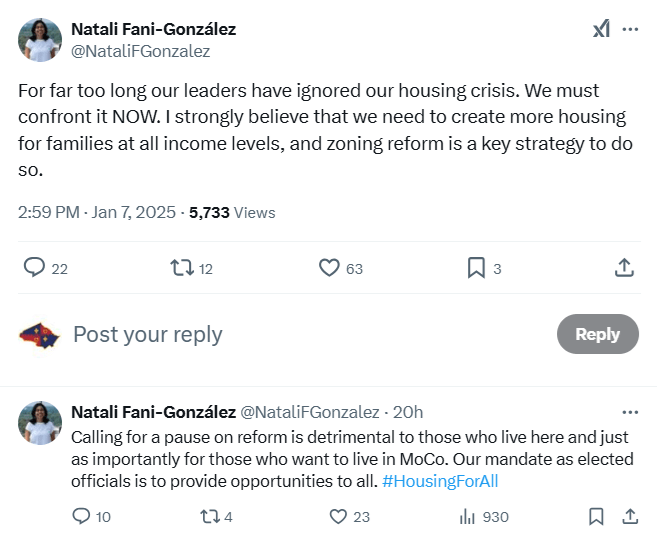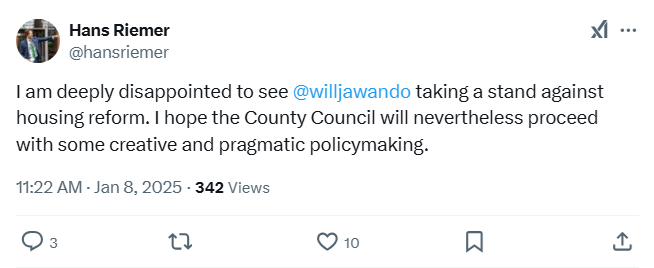By Adam Pagnucco.
Note: This post was updated to include comments from former Council Member Hans Riemer and Eric Saul.
Council Member Will Jawando stirred up a hornet’s nest with his statement calling for a “pause” on the county’s attainable housing strategies initiative. The stingers are out, fast and furious, looking for their target. But will Jawando really get stung?
First among the hornets was Council Member Natali Fani-González, who attacked Jawando on X without directly naming him.

Next came former Council Member Hans Riemer, who was one of the county’s biggest housing proponents during his three terms on the council. (Disclosure: I was Riemer’s chief of staff in his first term.)

Architect Eric Saul, founder of the Takoma Torch and creator of the satirical character Nimbee, told me, “It’s just very disappointing to have believed you were supporting someone who shared your progressive values only to find out that they, too, bow down to pressure from a vocal minority of our wealthiest residents. The high cost of the housing shortage is the number one domestic issue facing the country – it’s the largest inflation hit for families – and we’re still waiting for Montgomery County to lead on this issue.”
The YIMBY MoCo Facebook group, the gathering spot for hundreds of county housing supporters, was a hotbed of rage yesterday. Members accused Jawando of being “spineless,” joining the “stagnation caucus” and plotting to obtain Marc Elrich’s lane in the next county executive race. (Elrich has been a bitter opponent of the attainable housing initiative for months.) One member wrote this to the county council: “I was really shocked and disheartened to hear that council member Will Jawando requested a pause on the attainable housing plan. I think his only goal here is to win over Marc Elrich’s anti-housing voter base in yet another attempt to seek higher office.”
Several housing supporters crying betrayal have pointed to Jawando’s Zoning Text Amendment (ZTA) 20-07, which would have allowed more multi-unit housing in transit corridors. (The ZTA along with accompanying legislation, which Jawando called “More Housing for More People,” expired without a vote.) In a December 2020 press release, Jawando commented:
Under this zoning proposal, more flexibility would be allowed for projects constructed on R-60 zoned sites located within a half mile of a Metrorail Station. Such sites would be excluded from infill lot coverage limits and the minimum parking requirements would be decreased.
“Missing Middle” housing refers to a range of building types that are compatible in scale, form and construction with single-family homes, but include multiple housing units. Missing Middle housing is typically a two-to-four story multi-unit, clustered housing such as smaller townhouses, duplexes, triplexes, quadruplexes, detached courtyard cottages, attached courtyard apartments or smaller apartment buildings (with fewer than 20 units) that are typically in walkable, transit-accessible neighborhoods.
ZTA 20-07 aims to provide a solution to the lack of this “missing middle” housing stock by removing existing barriers and encouraging the development of these types of housing near existing transit corridors.
But Jawando preemptively took on that argument in his statement, alleging that his ZTA was “intentionally narrow, focusing on areas close to transit where we could build more sustainably and responsibly.” In contrast, he characterizes attainable housing as “going far beyond” his ZTA and recommending “sweeping changes to zoning that could affect large parts of Montgomery County.”
Greater Greater Washington’s Dan Reed, the most influential YIMBY (yes in my backyard) in Maryland, responded to Jawando today. Reed characterized Jawando’s stance as “a win for Marc [Elrich] and a small group of wealthy neighbors who wanted that outcome all along, and a huge loss for the county.” Reed also wrote this:
The past four years have been a pause since More Housing for More People [Jawando’s prior housing legislation], and the council’s inaction on housing production has come at a big cost. The median home price in Montgomery County was $610,000 in December 2024, compared to $504,000 in December 2020. The cost of living is rising, and middle-income households are leaving. The economy is sluggish. The county, and the state, are facing budget crises due to falling tax revenues.
The fallout isn’t all bad for Jawando. As an influential figure in the passage of the county’s rent control law, the real estate community was never going to support him in the future regardless of his position on attainable housing. And he obtained many expressions of support on social media, including from some unlikely suspects. Attainable housing is controversial in many parts of the county so anyone opposing it will get access to skeptics looking for a champion. Now they have Jawando to go along with the term-limited Elrich (who appears headed back to the county council).
Regardless of anyone’s opinion on the policy aspects of Jawando’s position, even many of his critics admit that there is a political upside to it. We’ll have more on that in the near future.
